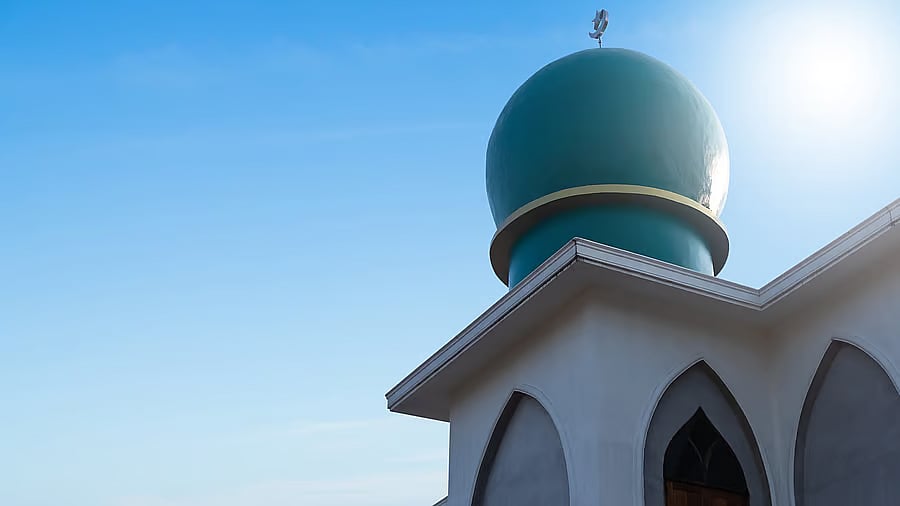
Representative image showing a mosque
Credit: iStock Photo
What motivated a Mumbai builder to promise a ‘halal environment’ for his upcoming project? Given that the advertisement for the proposed township, uploaded on Instagram a few weeks back, had a burqa-clad woman as its narrator, was it even necessary to mention ‘shared community values’ and show visuals of topi-clad Muslims? The persona of the narrator alone would have been enough to attract the target audience.
The furore that followed was predictable. The advertisement has been taken off, and now there’s talk of the project not being allowed. Forget the Bharatiya Janata Party (BJP), which sees red at anything labelled `halal’, even Rohit Pawar, the young face of Sharad Pawar’s Nationalist Congress Party (NCP), has criticised the project as being against the Constitution.
Does a private housing project advertised to attract only one community violate the Constitutional guarantee of non-discrimination on grounds of religion? Isn’t this guarantee violated every day across India when a Muslim goes house hunting, as the media has reported innumerable times?
Earlier, such discrimination was somewhat shamefaced, hidden under the fig leaf of ‘vegetarians only’, or mentioned discreetly by the broker. Today it’s upfront and unabashed. Even on the few occasions when Hindu homeowners have rented or sold their homes to Muslims, the deal has been opposed by those who have neither the right nor the grounds to do so. Hindu neighbours, emboldened by and sometimes instigated by local Hindutva activists, including elected representatives of the BJP, have conducted public campaigns against such deals. The proposed presence of a single Muslim family in their midst has been projected by them as a harbinger of untold horrors, from smells of meat to disruption of their ‘saatvik’ lifestyle by hordes of Muslims out to take over their area.
None of this is legal or constitutional; indeed, sometimes, the police and once, even the court has intervened. But by then, the Muslim buyer has got the message that they are unwanted in that colony.
Given this reality, is it unreasonable for a Muslim to buy land and build homes for his own community, set up a neighbourhood where they can feel they belong?
The advertisement’s promise of a mosque ‘within walking distance’ has aroused anger. But when Muslims are prevented from praying on the premises of their mixed housing colony, as happened in 2022 in a colony built by a BJP politician, and when any allotment of land by local authorities for a new mosque or graveyard is met with threats of violence by Sangh parivar groups, why is it wrong for a builder to highlight that their new project includes a mosque?
It’s not something new: many new projects list the presence of a temple nearby as one of their plus points. But, nobody makes a fuss then.
Similarly, there’s no outcry when projects are advertised as being exclusively for vegetarians. Surely it should be unconstitutional to ban those who eat meat from buying a flat in a particular complex? If the argument is that the building is privately owned and can have its own rules, then the same could apply to the ‘halal township’. Also, what about flats sold ‘by invitation only’? That’s again a form of discrimination nobody objects to.
These double standards make the opposition to the project suspect, more so when the opponents (except Pawar) have never raised their voice against the unannounced ban on renting/selling flats to Muslims. Priyank Kanungo, the NHRC member who sent notice to the Maharashtra government over the advertisement, called the township an attempt to set up ‘a nation within a nation...’. Kanungo, as head of the National Commission for Protection of Child Rights, used his position to oppose madrasa education and also challenged the court-ordered protection given to a Muslim couple. In both cases, the Supreme Court ruled against the NCPCR, perhaps for the first time in the institution's history.
Incidentally, the Supreme Court in 2005 upheld the right of a co-operative housing society formed by one community, to restrict membership of the society to its own community. The decision concerned a Parsi colony; the rationale was that the society had been established to provide housing for Parsis, a minority group. Given that logic, would a residential colony built for Muslims only pass the constitutional test? Indeed, such colonies do exist in Mumbai, but when they were set up, 30 years ago, the need they served didn’t require advertising!
The burqa-clad narrator in the ‘halal township’ advertisement has raised the usual hackles. But today, even Hindu builders setting up projects in Muslim areas employ burqa-clad saleswomen, say Muslim house-hunters, who also report getting calls for such projects which begin with a ‘salam-alekum’.
Such ‘appeasement’ is apparently acceptable, as long as it’s discreetly done. If only the ‘halal township’ builder had followed the rules for Muslims in `New India' and stayed invisible.
Jyoti Punwani is a senior journalist. (Author's X handle: @jyotipunwani)
Disclaimer: The views expressed above are the author's own. They do not necessarily reflect the views of DH.